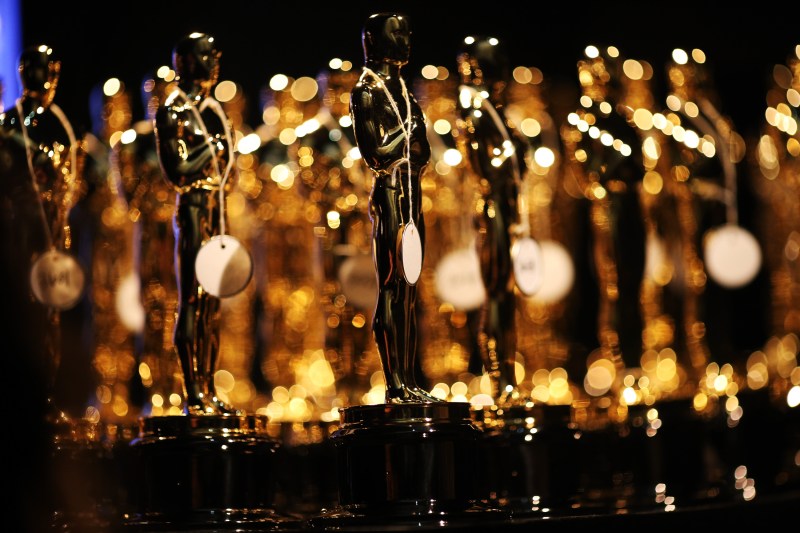First impressions from the Daily staff after watching the Academy Awards: “an emotional rollercoaster,” “very commercialized,” “I’m not surprised that Green Book won” and “‘Buster Scruggs’ was robbed.” Mine was not fit for print.
Let’s not undersell the 2019 Oscars. There were plenty of adorable moments, from Olivia Colman’s flabbergasted speech to Spike Lee’s ecstatic leap into Samuel L. Jackson’s arms. No matter how harshly the Oscars are critiqued, no matter whether the winner is a first-time underdog or Meryl Streep, there’s something always undoubtedly appealing about seeing people rewarded for hard work.
But let’s not oversell the 2019 Oscars either. At the end of the night, despite the moving musical performances and bevy of charming highlights, the show left a pit in my stomach. This year was surprisingly unsurprising; in a year with the potential to give the trophy to a beautiful foreign-language masterpiece (“Roma”), a daring dark period thriller (“The Favourite”), or either of two excellent movies on race (“BlacKkKlansman” and “Black Panther”), it was instead handed to “Green Book,” the controversial yet unremarkable drama about feel-good race relations that is the worst-reviewed Best Picture winner since 2006.
The “I’m not surprised” reaction was the right one. How dare we expect that the Oscars be used as a celebration of what movies have the potential to accomplish? In a year where “Vice” and “Bohemian Rhapsody,” both with steady low ’60s on Rotten Tomatoes, are running for the best film of 2018, how dare we expect that dedication to craft and style be recognized by the Academy of professionals who are supposedly experts in this art form?
“Green Book”’s victory is a simple continuation of a long-running pattern. The best film, in retrospect, never takes home the statue. Alfred Hitchcock never won Best Director. “Citizen Kane” failed to earn Best Picture, losing out not to the also-classic “The Maltese Falcon,” but to the now-forgotten “How Green was My Valley.” And part of the reason why Spike Lee’s screenwriting victory is so momentous is that his “Do the Right Thing,” arguably the most monumental movie on American race relations in history (as well as one of the best films of all time), was never even nominated for the Academy’s top honor.
While this pattern may seem clear to a group of student film buffs munching on pizza on a college campus, the Academy still seems utterly oblivious. Every once in a blue moon there’s a glimmer of hope; “Moonlight”’s victory over “La La Land” indicated that, maybe, the Academy had turned on its windshield wipers. Instead, as this year proved, they remain blind to their own spiraling irrelevancy, turning on the wipers, but still crashing the car.
“Green Book” might be considered the “safe” movie, but “Green Book” is anything but. Upon release, it was assailed with controversy from all directions, for the failure to consult the family of Mahershala Ali’s character, for the xenophobic views recently expressed by Viggo Mortensen’s character, and for the deeply problematic depiction of race.
But “Green Book” does have one thing going for it: It is expertly constructed, perfectly crafted, to make white people feel better. There is no tragic villain condemned by his rage (as in the ending to “Black Panther”), no burning cross followed by documentary-style footage of Nazi marches (as in the end of “BlacKkKlansman”). Walk out of “Green Book,” and you’ll realize that, if you stick two men in a car for a few days, all their differences will be resolved, and all of America’s ethnic groups can hold hands and sing Kumbaya.
The Academy watched “Green Book” and they felt better about themselves. Movies have always been fantasies, but the approximately 90 percent of the Academy that is white apparently wants to celebrate movies that sell their fantasy as reality. I hardly believe that a group of people who’ve spent their lives in the movie industry genuinely think that “Green Book” is better than “Roma,” but what they saw in “Green Book” was a movie that, on the surface, could satisfy the whiny “Oscars so white” activists and make them feel good about how “in the loop” they are.
The Academy is old, in every meaning of the word. With “Green Book”’s victory, they have slipped the final nail in their coffin and thrown themselves into the grave of irrelevancy. The Oscars will come again next year, and with it the usual fanfare of dresses and guesses. There will be an entertaining, glamorous show and a smattering of mediocre jokes, and I, like every year, will be watching eagerly and attentively. But when the curtain lifts in 2020, we should be careful to see the Oscars as they are. Not an awards show, not an honor or a testament to quality, but a gilded game, with too many wrong winners.
Contact Noah Howard at noah364 ‘at’ stanford.edu.
